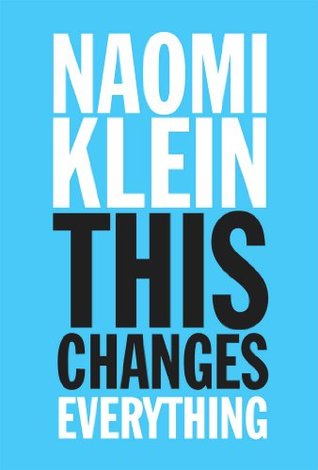More on this book
Community
Kindle Notes & Highlights
by
Naomi Klein
Read between
September 14 - December 29, 2021
Climate change has never received the crisis treatment from our leaders, despite the fact that it carries the risk of destroying lives on a vastly greater scale than collapsed banks or collapsed buildings.
Clearly, what gets declared a crisis is an expression of power and priorities as much as hard facts.
Droughts and floods create all kinds of business opportunities besides a growing demand for men with guns.
Superstorm Sandy, meanwhile, has been a windfall for New Jersey real estate developers who have received millions for new construction in lightly damaged areas, while it continues to be a nightmare for those living in hard-hit public housing, much as the aftermath of Hurricane Katrina played out in New Orleans.10
the annual U.N. climate summit, which remains the best hope for a political breakthrough on climate action, has started to seem less like a forum for serious negotiation than a very costly and high-carbon group therapy session, a place for the representatives of the most vulnerable countries in the world to vent their grief and rage while low-level representatives of the nations largely responsible for their tragedies stare at their shoes.12
Contemporary humans are too self-centered, too addicted to gratification to live without the full freedom to satisfy our every whim—or so our culture tells us every day. And yet the truth is that we continue to make collective sacrifices in the name of an abstract greater good all the time. We sacrifice our pensions, our hard-won labor rights, our arts and after-school programs. We send our kids to learn in ever more crowded classrooms, led by ever more harried teachers. We accept that we have to pay dramatically more for the destructive energy sources that power our transportation and our
...more
we have not done the things that are necessary to lower emissions because those things fundamentally conflict with deregulated capitalism, the reigning ideology for the entire period we have been struggling to find a way out of this crisis. We are stuck because the actions that would give us the best chance of averting catastrophe—and would benefit the vast majority—are extremely threatening to an elite minority that has a stranglehold over our economy, our political process, and most of our major media outlets.
The three policy pillars of this new era are familiar to us all: privatization of the public sphere, deregulation of the corporate sector, and lower corporate taxation, paid for with cuts to public spending.
The twin signatures of this era have been the mass export of products across vast distances (relentlessly burning carbon all the way), and the import of a uniquely wasteful model of production, consumption, and agriculture to every corner of the world
our economic system and our planetary system are now at war. Or, more accurately, our economy is at war with many forms of life on earth, including human life.
rich countries dig in their heels and declare that they won’t cut emissions and risk losing their vaulted position in the global hierarchy; poorer countries declare that they won’t give up their right to pollute as much as rich countries did on their way to wealth, even if that means deepening a disaster that hurts the poor most of all.
climate change isn’t an “issue” to add to the list of things to worry about, next to health care and taxes. It is a civilizational wake-up call. A powerful message—spoken in the language of fires, floods, droughts, and extinctions—telling us that we need an entirely new economic model and a new way of sharing this planet. Telling us that we need to evolve.
“How sad to think that nature speaks and mankind doesn’t listen.” —Victor Hugo, 18402
The Yale researchers explain that people with strong “egalitarian” and “communitarian” worldviews (marked by an inclination toward collective action and social justice, concern about inequality, and suspicion of corporate power) overwhelmingly accept the scientific consensus on climate change. Conversely, those with strong “hierarchical” and “individualistic” worldviews (marked by opposition to government assistance for the poor and minorities, strong support for industry, and a belief that we all pretty much get what we deserve) overwhelmingly reject the scientific consensus.17
What they care about, however, is exposing it as a “hoax” being perpetrated by liberals to force them to change their light bulbs, live in Soviet-style tenements, and surrender their SUVs. For these right-wingers, opposition to climate change has become as central to their belief system as low taxes, gun ownership, and opposition to abortion.
For months, virtually the entire Louisiana fishing fleet was docked, unable to make a living for fear that the seafood was unsafe. That’s when BP offered to convert any fishing vessel into a cleanup boat, providing it with booms to (rather uselessly) mop up some oil. It was tremendously difficult for local shrimpers and oystermen to take work from the company that had just robbed them of their livelihood—but what choice did they have? No one else was offering to help pay the bills. This is the way the oil and gas industry holds on to power: by tossing temporary life rafts to the people it is
...more


